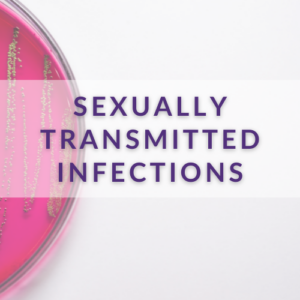Sexually Transmitted Infections

Sexually transmitted infections (STIs) are viruses and bacteria that are contracted during sexual contact and have the potential to cause disease in the body. This can include vaginal, anal, and oral sex, as well as skin-to-skin contact. Some STIs are curable with antibiotics and while others are not, they can be managed with proper medical care.
Gonorrhea, chlamydia, and trichomonas are examples of bacterial STIs that can be found in the cervix and vagina. They can cause changes in vaginal discharge, abnormal bleeding, pelvic pain, and burning with urination. Sometimes, women don’t have any symptoms, which is why it is important to consider screening tests if you are sexually active even with no symptoms. These infections can be treated with antibiotics, and your partner will need to be treated as well, to prevent continuously passing the infection back and forth. If left untreated, these infections can cause pelvic inflammatory disease which can result in loss of fertility. Screening/testing for these bacteria can be done with a urine sample or a vaginal swab.
Other infections are from viruses that can be detected in blood work, a skin culture, or a cervical pap smear. Examples of sexually transmitted infections that are viral include human immunodeficiency virus (HIV), hepatitis B and C, human papillomavirus,, and herpes simplex virus.
Using condoms consistently, and correctly, are the best way to protect yourself against STIs. Consider getting vaccinated against hepatitis B and HPV.
Get tested promptly if you are having symptoms or consider routine screening even if you are asymptomatic.
You can learn more about STIs and STDs here: https://www.cdc.gov/std/healthcomm/fact_sheets.htm
Please talk to your provider if you think you may have an STI or have been exposed to an STI.